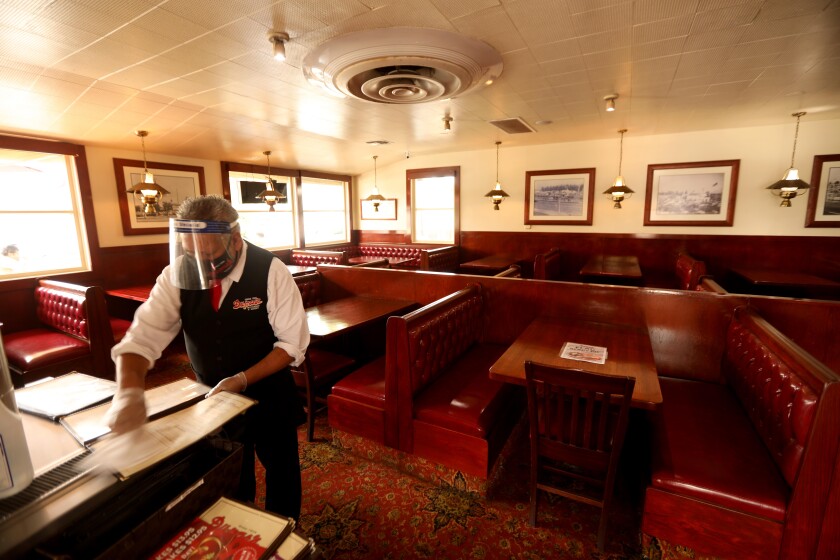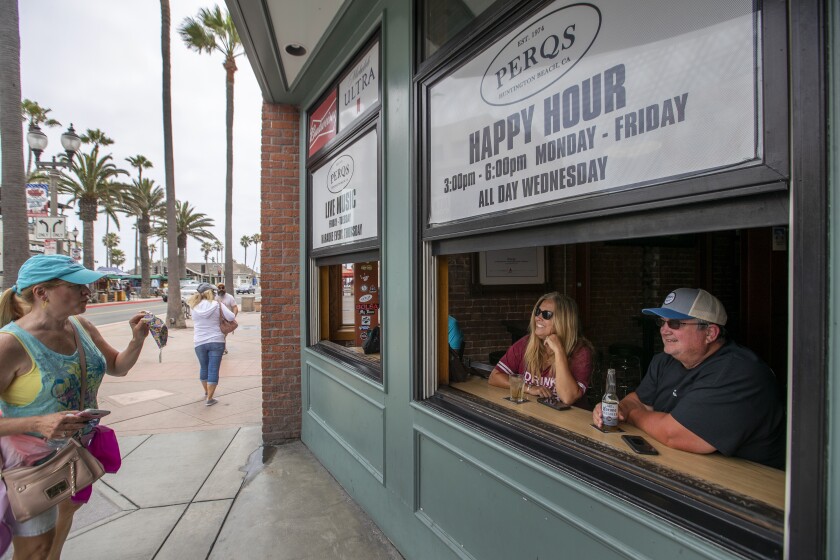Restaurant dining rooms, wineries, card rooms to close for at least three weeks in 19 counties

By TARYN LUNA, PHIL WILLON Los Angeles Times
Gov. Gavin Newsom on Wednesday ordered tougher restrictions on indoor activities for most of the state, marking a major step backward in the reopeningand an attempt to slow an alarming rise of the coronavirus in 19 counties.
The governor took action to halt visits to indoor restaurants, bars, wineries and tasting rooms, entertainment centers, movie theaters, zoos, museums and card rooms for the next three weeks in Los Angeles, Riverside, Ventura, Orange, San Bernardino and Sacramento counties and other regions hard hit by the virus.
Newsom is imposing the restrictions in an effort to reduce opportunities for people to gather indoors in advance of the July 4 holiday weekend, when officials fear disaster if Californians continue to ignore safety guidelines and businesses remain open in areas already experiencing significant spikes in coronavirus infections.
Don’t miss stories like this Click for free EnviroPolitics Blog updates
As of Wednesday at 5 p.m., there were 237,068 confirmed cases of COVID-19 in California, following record increases earlier in the week, and 6,152 total deaths, according to data tracked by The Times.
“We have to be much more vigilant in terms of maintaining our physical distancing from others and be much more vigilant as it relates to the prospects of being in situations where we are transmitting COVID-19,” Newsom said. “The decisions we’re making here today — we do so soberly but thoughtfully and deliberately with an idea on mitigating the spread of this virus.”
The change signals a reversal in the state’s reopening that began in early May and quickly progressed by June 12 to allow retail stores, dine-in restaurants, bars, religious services, hair salons, gyms and other businesses to open again with modifications in counties that met state guidelines.

Newsom is also recommending the cancellation of all fireworks shows on the Fourth of July in the affected counties, and is urging Californians to rethink having large get-togethers with friends and neighbors to celebrate the holiday.
The governor emphasized that the new mandates would allow businesses to remain open for outdoor service and takeout. Bars and other drinking establishments in the affected counties are also allowed to seat guests outdoors as long as they sell a meal with drinks in the same transaction and meet all of the same safety requirements as restaurants.
The state applied the closures to counties that have been flagged for at least three consecutive days based on troubling longer-term data on key public health metrics, including hospitalizations, community transmission and hospital capacity. The state has been using the data to determine when counties are safe to open businesses and now to decide when to “toggle back,” as Newsom has described the process of reversing course and closing down.
Newsom’s order immediately applies to the affected indoor business activities in Contra Costa, Fresno, Glenn, Imperial, Kern, Kings, Los Angeles, Merced, Orange, Riverside, Sacramento, San Bernardino, San Joaquin, Santa Barbara, Santa Clara, Solano, Stanislaus, Tulare and Ventura counties.
State officials have long anticipated that reopening would lead to an increase in cases and risk of more deaths as Newsom shifted power to counties in May to open businesses at their own pace.
Newsom began sounding the alarm about the growing spread of the virus on June 18 by requiring Californians to wear masks or other face coverings in public and high-risk settings. But the state continued to speed up the reopening process and allowed personal care services in one of the highest-risk sectors, such as nail salons, massage parlors, tattoo shops and waxing services, to resume the next day.
The governor defended his administration’s approach to reopening the state’s economy on Wednesday, saying it relied heavily on local public health officials to assess the severity of the outbreak in their areas and to determine the safest approach.


